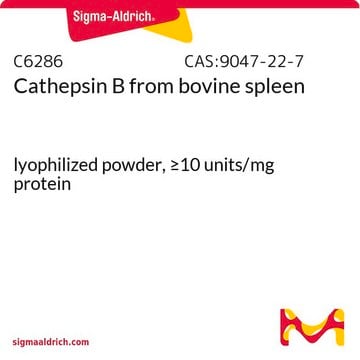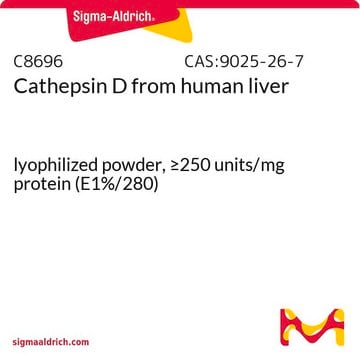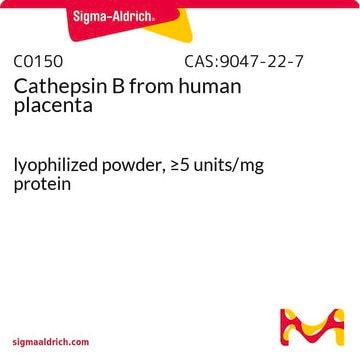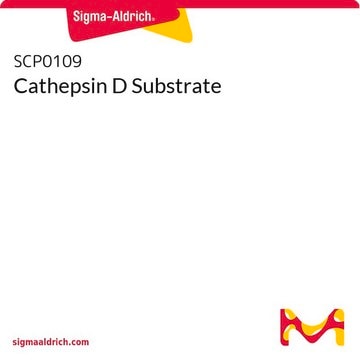C3138
Cathepsin D from bovine spleen
lyophilized powder, ≥2.0 units/mg protein
Synonyme(s) :
CTSD
About This Item
Produits recommandés
Source biologique
bovine spleen
Niveau de qualité
Pureté
10—70% protein (biuret)
Forme
lyophilized powder
Activité spécifique
≥2.0 units/mg protein
Poids mol.
~45 kDa
Fabricant/nom de marque
Sigma-Aldrich
Technique(s)
activity assay: suitable
Couleur
dark brown
Adéquation
suitable for molecular biology
Numéro d'accès UniProt
Application(s)
life science and biopharma
Température de stockage
−20°C
Informations sur le gène
cow ... CTSD(282883)
Vous recherchez des produits similaires ? Visite Guide de comparaison des produits
Description générale
Cathepsin D is a soluble endosomal-lysosomal aspartic protease and is synthesized in the rough endoplasmic reticulum as preprocathepsin D. It is encoded by the CTSD gene located in the 11p15.5 region.
Application
- in in vitro dose-dependent fluorometric activity assays.
- in in vitro myelin oligodendrocyte glycoprotein (MOG) digestion to study the uptake of malondialdehyde (MDA)-modified MOG and its implications in central nervous system autoimmunity.
- for enzymatic digestion of the proteoglycan moiety of the articular cartilage in order to determine its dynamic elastic modulus at two different levels of tissue organization.
- in cathepsin D activity assay.
Actions biochimiques/physiologiques
Définition de l'unité
Forme physique
Inhibiteur
Produit(s) apparenté(s)
Code de la classe de stockage
11 - Combustible Solids
Classe de danger pour l'eau (WGK)
WGK 3
Point d'éclair (°F)
Not applicable
Point d'éclair (°C)
Not applicable
Certificats d'analyse (COA)
Recherchez un Certificats d'analyse (COA) en saisissant le numéro de lot du produit. Les numéros de lot figurent sur l'étiquette du produit après les mots "Lot" ou "Batch".
Déjà en possession de ce produit ?
Retrouvez la documentation relative aux produits que vous avez récemment achetés dans la Bibliothèque de documents.
Les clients ont également consulté
Notre équipe de scientifiques dispose d'une expérience dans tous les secteurs de la recherche, notamment en sciences de la vie, science des matériaux, synthèse chimique, chromatographie, analyse et dans de nombreux autres domaines..
Contacter notre Service technique







